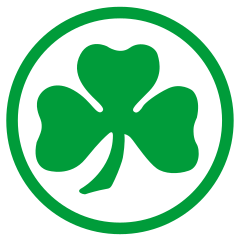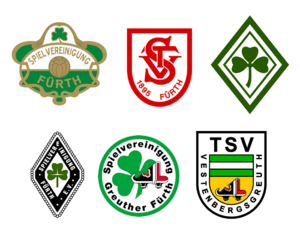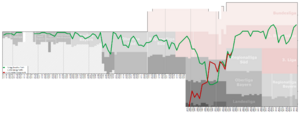SpVgg Greuther Fürth facts for kids
 |
|||
| Full name | Spielvereinigung Greuther Fürth e. V. | ||
|---|---|---|---|
| Nickname(s) | Kleeblätter (Cloverleaves) | ||
| Founded | 23 September 1903 as SpVgg Fürth | ||
| Ground | Sportpark Ronhof | ||
| Capacity | 16,626 | ||
| President | Fred Höfler | ||
| Head coach | Thomas Kleine | ||
| League | Bundesliga | ||
| 2020–21 | 2. Bundesliga, 2nd of 18 (promoted) | ||
|
|
|||
Spielvereinigung Greuther Fürth, often called Greuther Fürth, is a German football club from Fürth, Bavaria. They currently play in the 2. Bundesliga, which is the second-highest football league in Germany. The team was relegated from the top league, the Bundesliga, after the 2021–22 season.
The club was started in 1903. Greuther Fürth had its most successful time before the Bundesliga was created, in the 1910s and 1920s. During this period, they won the German championship three times: in 1914, 1926, and 1929. They also finished as runners-up in 1920. In the 2012–13 season, the club played in the Bundesliga for the first time. They were promoted from the 2. Bundesliga but went back down at the end of that season. On May 23, 2021, they were promoted to the Bundesliga again. However, after finishing 18th in the 2021–22 season, they were relegated back to the 2. Bundesliga.
Contents
Club History: SpVgg Fürth
How the Club Started
The club SpVgg Fürth began on September 23, 1903. It started as the football section of a gymnastics club called Turnverein 1860 Fürth. In November 1906, the football players decided to form their own club. This happened because they felt they didn't get enough support from the gymnastics club.
The team played in the Ostkreisliga and won their division in 1912, 1913, and 1914. After these wins, they played in regional playoffs to try and reach the national championship. From the very beginning, there was a big rivalry between SpVgg Fürth and 1. FC Nürnberg. This was because the two cities are close neighbors and have a historical rivalry. The club grew very quickly. By 1914, it had 3,000 members, making it the largest sports club in Germany. In 1910, the club built its own stadium, Sportpark Ronhof. At that time, it was the biggest stadium in Germany.
Winning National Titles
Fürth won their first national title in 1914 German football championship. They were led by English coach William Townley. One key player was Julius Hirsch, a left winger who joined the team the year before. In the final match on May 31 in Magdeburg, they played against VfB Leipzig. Leipzig was the defending champion with three titles already. The game was very long, lasting 154 minutes. It was the longest completed game in German football history. Fürth won by scoring a golden goal, which meant the game ended as soon as they scored.
The team continued to be successful through the 1920s and early 1930s. In 1920, they played in the national final against 1. FC Nürnberg. This club was very strong during that decade. The rivalry between Fürth and Nürnberg was so intense that one of SpVgg's best players had to leave the team. This happened because he married a woman from the city of Nuremberg. In 1924, for the only time ever, the German national team was made up only of players from Fürth and 1. FC Nürnberg. The players from the two teams even slept in separate train cars!
SpVgg often reached the national stages, making it to the semi-finals in 1923 and 1931. They won two more championships, in 1926 and 1929. Both of these wins were against Hertha BSC. During this time, the club played in five finals of the Süddeutscher Pokal (South German Cup), winning the cup four times. On August 27, 1929, another club, FC Schneidig Fürth, joined the association.
In 1933, German football was reorganized into 16 top leagues called Gauligen. Fürth became part of the Gauliga Bayern. Their success in the next 12 seasons was limited to winning a division title there in 1935. They also regularly played in the Tschammerpokal, which was the old version of today's DFB-Pokal (German Cup).
After World War II
After World War II, the team struggled for three seasons in the Oberliga Süd (the top league at the time). Then they dropped down to the Landesliga Bayern (the second league). However, SpVgg quickly improved and returned to Oberliga play the next season. They won the Oberliga Süd title in 1950 and went on to the national playoffs. They reached the semi-finals but were defeated 1–4 by VfB Stuttgart. In 1954, two players from SpVgg, Karl Mai and Herbert Erhardt, were part of the "Miracle of Bern" team. This team won Germany's first World Cup.
Fürth remained a top-division team until the Bundesliga was formed in 1963. The club did not qualify as one of the 16 teams for the new national first division. They found themselves playing in the second division, the Regionalliga Süd. Here, they usually finished in the middle of the table, with their best finish being third place in 1967. The club played in the 2. Bundesliga from its start in 1974 until 1983. Their best result was fourth place in the 1978–79 season. They then dropped to the third-tier Bayernliga, and even spent three years in the fourth-tier Landesliga Bayern-Mitte in the late 1980s. Around this time, the club started having big money problems.
In 1990, Fürth had a great 3–1 win in the first round of the DFB-Pokal against top-division team Borussia Dortmund. They then lost 0–1 to 1. FC Saarbrücken in the second round. They returned to the Bayernliga (third tier) in 1991 and the Regionalliga Süd (third tier) in 1994. But the club's financial issues continued to grow. They had to sell their stadium to a local businessman named Conny Brandstätter. As the money problems got worse, the president of SpVgg, Edgar Burkhart, made a deal with Helmut Hack, the president of TSV Vestenbergsgreuth. The deal was for TSV to join SpVgg and change the name of the club to SpVgg Greuther Fürth, which is still used today. This gave SpVgg a chance to improve both financially and on the field. Meanwhile, TSV could grow bigger in Fürth than it could in the small village of Vestenbergsgreuth.
TSV Vestenbergsgreuth
The small village team of TSV Vestenbergsgreuth was founded on February 1, 1974. They started as a fourth-division team. In 1987, they moved up to the Amateur Oberliga Bayern (third tier). This was just as SpVgg Fürth was dropping down to play in that same division. TSV took part in the national amateur playoff round in 1988 and 1995. Their best performance was in the 1995 DFB-Pokal. They famously beat Bayern Munich 1–0, and then defeated FC 08 Homburg 5–1. They were finally knocked out in the third round by VfL Wolfsburg after a penalty shootout.
SpVgg Greuther Fürth Today
When Vestenbergsgreuth's football section joined Fürth in 1996, both clubs were playing at a similar level in the Regionalliga Süd (third tier). The next year, SpVgg finished second in their division, just behind their old rival 1. FC Nürnberg. This earned them promotion back to the 2. Bundesliga after 18 years. It was their first time in the second tier since 1979.
At this time, the Sportpark Ronhof stadium, then called Playmobil Arena, had its first major upgrades since the 1950s. New stands were built on three sides of the pitch. A covered seating stand was added opposite the main stand. There was an uncovered standing area in the north end and a mixed standing and seating area in the south. For the first time ever, floodlights were installed at the Ronhof. With the improved stadium and smart player transfers, the team often finished in the top half of the 2. Bundesliga table in the 2000s. This happened even though they usually had one of the lowest budgets. On July 1, 2003, the club also merged with Tuspo Fürth, adding to its history.
In 2008, the stadium was upgraded again. The standing terrace in the north got a roof, and a VIP building was added near the old main stand. At that point, the main stand was the only part of the stadium that hadn't been rebuilt. Around this time, Fürth came close to playing against Nürnberg in the Bundesliga again. They just missed promotion in the first two seasons of the 2010s. On April 23, 2012, Fürth finally earned promotion to the Bundesliga in the 2011–12 season. They won the 2. Bundesliga under manager Mike Büskens. With this promotion, the south stand, built in 1998, was taken down. A new one was built, increasing the stadium's capacity from 14,500 to 18,000. The new south stand also had a roof for the first time.
However, Fürth had a tough first season in the Bundesliga. They only won four games out of 34. One of these wins was a 1–0 victory at the home of their rivals, 1. FC Nürnberg. This win gave the Kleeblatt fans a good feeling, even though their team was relegated. The club also set a record by being the first team in Bundesliga history not to win a single home game during the season. They finished last with 21 points and were relegated back to the 2. Bundesliga.
The next season, even though they weren't trying to get promoted, the club was a strong team for returning to the Bundesliga. They finished third in the league, which meant they qualified for the promotion play-offs. They played against Hamburger SV. After a 0–0 draw in Hamburg, they missed out on promotion because of the away goal rule. The return game ended 1–1. In the seasons that followed, they weren't as strong as they had been before their first Bundesliga promotion. They almost got relegated to the 3. Liga in the 2014–15 season. They stayed in the league only because of a close win against SV Darmstadt 98 on matchday 33, and other teams not winning on matchday 34. In the same season, on matchday 2, they had a memorable 5–1 home victory in the Frankenderby. This was their biggest home win ever in a derby.
In the next two years, Spielvereinigung finished in the middle of the table. They weren't worried about relegation, nor were they close to promotion. During this time, FCN (Nürnberg) was relegated in 2014, and both rivals have played each other every year since then. In the 2016–17 season, the Kleeblatt won both derby matches for the first time since the 1970s. They also finished above Nuremberg for the first time since the 1950s. In early 2016, the main stand, built in 1950, was torn down, and construction of a new main stand began. Before the 2017–18 season, the new main stand was finished. With a 3–1 win over Fortuna Düsseldorf on September 17, 2017, the club became the leader of the all-time league table for the 2. Bundesliga.
By finishing second in the 2020–21 season, Greuther Fürth was promoted to the Bundesliga for the second time in the club's history. Under manager Stefan Leitl, the team secured promotion on the last day of the season with a 3–2 victory over Fortuna Düsseldorf.
SpVgg Greuther Fürth II
Fürth also has a reserve team, called SpVgg Greuther Fürth II. This team has played in the Oberliga Bayern (fourth tier) since the 2001–02 season. They finished second there in 2006–07, which led to their promotion to the Regionalliga Süd.
Club Rivals
1. FC Nürnberg is by far Fürth’s biggest rival. This rivalry goes back to the early days of German football, when these two clubs sometimes dominated the national championship. Matches between these two teams are called the "Frankenderby". Other minor rivals include Bayern Munich. Both Fürth and Bayern Munich played against each other in the 2012–13 Bundesliga season and the 2014–15 2. Bundesliga season.
Club Honours
League Titles
- German Championship
- Champions: 1914, 1926, 1929
- 2. Bundesliga
- Champions: 2011–12
- Landesliga Bayern-Mitte (Fourth Tier)
- Champions: 1990–91
Cup Wins
- German Indoor Cup
- Winner: 2000
Regional Titles
- Southern German Championship
- Champions: 1914, 1923, 1931
- Ostkreis-Liga (First Tier)
- Champions: 1912, 1913, 1914, 1917
- Kreisliga Nordbayern (First Tier)
- Champions: 1922, 1923
- Bezirksliga Nordbayern (First Tier)
- Champions: 1927–28, 1929–30, 1930–31
- Gauliga Bayern (First Tier)
- Champions: 1934–35
- Oberliga Süd (First Tier)
- Champions: 1949–50
- Southern German Cup
- Winner: 1918, 1923, 1925, 1926, 1927 (a record five times)
- Mittelfranken Cup (Tiers III–VII)
- Winner: 1990, 1991, 1996, 1997
- Runners-up: 1989
Invitational Tournaments
- Tournoi de Pentecôte de Paris
- Winner: 1925
Youth Team Honours
- Bavarian Under 19 Championship
- Champions: 2003
- Bavarian Under 17 Championship
- Champions: 2001, 2008
- Bavarian Under 15 Championship
- Champions: 2004
Current Players
First Team Squad
|
|
Players on Loan
|
|
Famous Former Players and Coaches
- Karl Mai: Played 21 games for Germany and was part of the 1954 World Cup winning team.
- Herbert Erhardt: Played 50 games for Germany and was in the World Cups of 1954, 1958, and 1962.
- Julius Hirsch: Played 7 games for Germany and was in the 1912 Summer Olympics.
- Heiko Westermann: A German international player.
- Roberto Hilbert: A German international player.
- Rachid Azzouzi: Played for Morocco in the 1994 and 1998 World Cups.
- Gerald Asamoah: A German international player.
- Nicolai Müller: A German international player.
- Abdul Rahman Baba: A Ghana international player.
- Stephan Schröck: Captain of the Philippines national team.
Famous Coaches
William Townley: Coached SpVgg Fürth three times (1911–1913, 1926–1927, and 1930–1932) and led the club to two championships.
Notable Fans
In September 2012, former United States Secretary of State Henry Kissinger attended a SpVgg match against Schalke 04. His family had left Nazi Germany in 1938. He had promised to attend a game at the Ronhof stadium if the team was promoted to the top-flight Bundesliga. As a child, Kissinger had tried to watch games there, even though his parents didn't want him to. Kissinger was an honorary member of SpVgg. For many decades, he kept up with the team's results and stayed in touch with the club. When he worked in the White House in the 1970s, he reportedly asked his staff to have the team's weekend score ready for him on Monday mornings. He visited his hometown and the club several times. He attended a Bundesliga match in 2012 during the team's first season in the Bundesliga.
See also
 In Spanish: Spielvereinigung Greuther Fürth para niños
In Spanish: Spielvereinigung Greuther Fürth para niños
 | John T. Biggers |
 | Thomas Blackshear |
 | Mark Bradford |
 | Beverly Buchanan |



